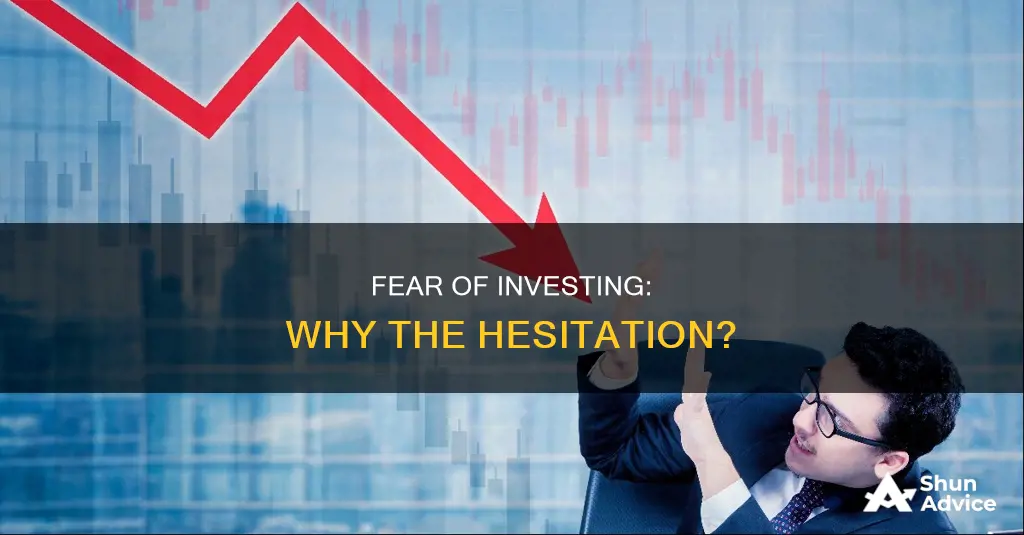
Many people are scared to invest in the stock market. The Global Financial Crisis in 2008 gave investing a bad name and exacerbated fears. Most people continue to associate investing with market crashes and money loss. Returns aren’t guaranteed and there is a risk of getting back less than you originally invested. This fear of losing money is deeply ingrained in our psyche and is tied to our survival instincts. We are loss averse, meaning we prefer to avoid losing something we possess, rather than take a risk in hopes of a big win.
However, not investing can be detrimental to your financial future. While it can be scary, there are ways to help manage your investment risk, such as spreading your money across different investment types and regions.
| Characteristics | Values |
|---|---|
| Fear of losing money | The pain of losing money is twice as powerful as the pleasure of gain |
| Fear of missed opportunities | Fear of falling behind or missing out (FOMO) |
| Lack of knowledge | Dunning-Kruger effect |
| Reacting to market volatility | Fight-or-flight response |
| Fear of commitment | Locking away money for a significant period |
What You'll Learn

Fear of losing money
The fear of losing money is deeply ingrained in our psyche. Losing money can be twice as painful as the pleasure of gaining the same amount. This primal instinct is tied to our survival instincts. For most of human history, losing resources could mean life or death. This fear of losing money is also called "loss aversion".
This fear of losing money is the main reason why people are scared to invest. People tend to avoid investing because they fear potential losses more than they value potential gains. This fear often manifests as indecision, inaction, inertia, apathy, inattention, and internal resistance.
The 2008 Global Financial Crisis gave investing a bad name and exacerbated this fear. Most people continue to associate investing with market crashes and money loss. The fear of losing money is further fuelled by stories of people losing money in the stock market.
To overcome the fear of losing money, one must change their mindset. It is important to understand that investing is not gambling. It involves making calculated decisions based on research and analysis. Diversifying your portfolio by spreading your money across different investment types and regions can also help mitigate the risk of losing money.
Additionally, maintaining an emergency fund that covers 3-6 months' worth of living expenses can provide peace of mind and reduce the fear of losing money.
Education and Investment: Any Correlation?
You may want to see also

Lack of knowledge
People may also be scared to invest due to a lack of knowledge about how investing works. This can lead to feelings of intimidation and hesitation. However, it is important to remember that basic knowledge about investing is sufficient to make informed decisions.
To overcome this fear, one should educate themselves about the basics of investing. This can be done by reading books, listening to podcasts, or taking online courses. Gaining knowledge about investing will help individuals make informed decisions and increase their confidence. Legendary investor Warren Buffett famously said, "Risk comes from not knowing what you're doing."
By taking the time to understand how investing works, individuals can make more informed decisions about their financial future and increase their confidence in their investment choices. It is important to remember that one does not need to be an expert to start investing, but having a basic understanding can help mitigate risks and improve long-term financial outcomes.
Investing: A New National Pastime?
You may want to see also

Fear of falling behind
The fear of falling behind, or FOMO (fear of missing out), is a common barrier to investing. This fear is driven by our natural competitiveness and the visibility of others' successes on social media. It can lead to risky investment behaviours, such as jumping on an investment bandwagon without conducting thorough research.
To overcome this fear, it is important to remember that investing is a long-term strategy rather than a get-rich-quick scheme. Focus on your financial goals and stick to your investment plan, regardless of what others are doing.
Educating yourself about investing can also help to alleviate this fear. Online resources, books, podcasts, and courses can provide valuable knowledge and improve your confidence in making investment decisions.
Additionally, starting small and seeking professional advice can help you become more comfortable with investing. Remember that investing is not a competition, and it is important to make informed decisions that align with your financial goals and risk tolerance.
By focusing on your financial plan and educating yourself, you can overcome the fear of falling behind and make more confident investment decisions.
Investing: Nice People Turn Nasty
You may want to see also

Reacting to market volatility
Market volatility can be scary. When the market takes a downturn, our natural instinct is to panic and sell. This reaction is linked to our fight-or-flight response. When we experience stress or heightened emotions, we enter a state of 'emotional flooding', where our more animalistic instincts overpower our rationality. This can lead to bad financial decisions.
No one can predict when markets will go up or down, and short-term disappointment is the price of admission for better long-term returns. So, what can we do to overcome this fear?
Firstly, it is important to stay calm and manage your emotions. Stick to your long-term investment plan and try to ignore the noise of market volatility. Remember that investing is a long-term game, and the best results come to those who wait.
Secondly, ensure you have a safety harness in place. Run 'what if' scenarios with a financial planner to prepare for the unexpected and give yourself peace of mind.
Finally, understand that market volatility is an inevitable part of investing. On average, we can expect a one-third decline in the market every five years. Accepting this reality can help you to react more calmly when it happens.
In summary, reacting to market volatility is all about keeping a cool head and sticking to your long-term plan. By staying calm, preparing for the unexpected, and accepting the ups and downs of the market, you can overcome your fear of market volatility and become a more confident investor.
China's Bubble: Global Investment Risk
You may want to see also

Fear of commitment
Investing can be scary, and fear of commitment is a common reason why people are hesitant to invest. This fear often stems from the uncertainty of the market and the potential for loss. People may worry about a sudden market crash or unexpected expenses, such as a vacation or emergency. As a result, they may be reluctant to lock away their money for a significant period.
However, it's important to remember that investing is a long-term game and not a get-rich-quick scheme. While there are risks involved, there are also potential rewards. By diversifying your portfolio and maintaining an emergency fund, you can help mitigate the risks associated with investing. It's also crucial to educate yourself about investing and understand that it involves making calculated decisions based on research and analysis rather than gambling.
To overcome the fear of commitment to investing, it's essential to find the right balance between liquidity and growth. Liquidity refers to how easily you can turn an investment into cash without losing value, while growth is about increasing the value of your investments over time. While you may not be able to achieve total liquidity and maximum growth simultaneously, maintaining an emergency fund that covers 3-6 months of living expenses can give you the peace of mind to invest your other funds.
Additionally, it's important to remember that the cost of inaction can be high. By not investing, you may miss out on opportunities for wealth growth and securing your financial future. As American entrepreneur Jim Rohn said, "We must all suffer one of two things: the pain of discipline or the pain of regret." Therefore, it's crucial to take control of your investing future and not let fear dictate your financial decisions.
Overall, while fear of commitment is a valid concern for many people, it should not prevent individuals from exploring investment opportunities. By educating oneself, diversifying investments, and maintaining an emergency fund, individuals can take measured risks to grow their wealth over time.
Bankers: Bad Apples or Bad Barrel?
You may want to see also
Frequently asked questions
There are several reasons people are afraid to invest. The most common is the primal fear of losing money, which is deeply ingrained in our psyche due to our survival instincts. This fear is exacerbated by stories of people losing money in the stock market, like during the 2008 financial crisis. Other reasons include a lack of knowledge about investing, fear of falling behind or missing out, reacting to market volatility, and fear of commitment.
The fear of losing money is twice as powerful psychologically as the pleasure of gaining money. This means people are more likely to avoid investing due to the potential losses they might incur. This fear can lead to indecision, inaction, and a preference for saving money in low-interest accounts rather than investing in riskier assets with higher potential returns.
To overcome the fear of investing, it's important to change one's mindset and understand that investing isn't gambling. It involves making calculated decisions based on research and analysis. Diversifying one's portfolio by investing in various assets, sectors, and companies can also help mitigate the risk of losses. Additionally, maintaining an emergency fund or safety net can provide peace of mind and reduce the fear of losing one's entire investment.







